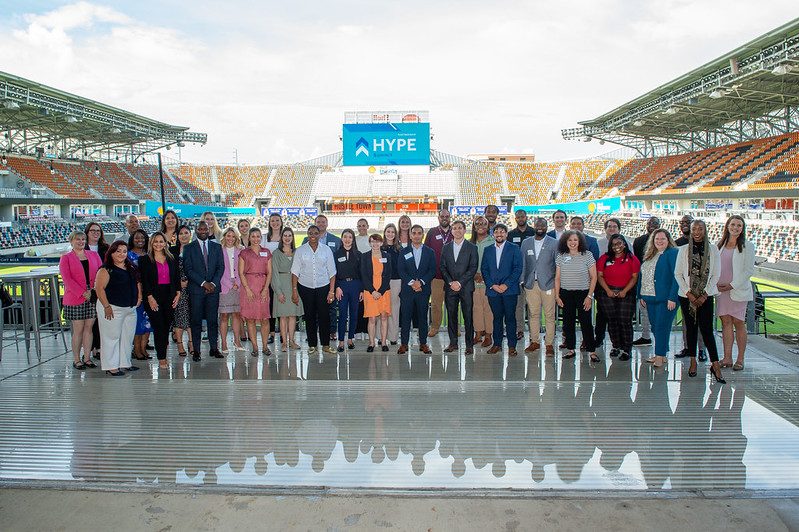COVID-19 Public Policy Update: March 19, 2020
Published Mar 19, 2020 by Taylor Landin
In response to the novel coronavirus (COVID-19), the Partnership will provide a daily update on public policies and other newsworthy items from local, state and national levels of government. Today all levels of government continued to focus on strategies to contain COVID-19.
Executive Summary
At the federal level, there is an emphasis on supporting hospital preparedness. Today, President Trump is invoking the Defense Production Act to spur the domestic production of personal protective equipment and critical medical supplies, including ventilators and respirators. Federal legislation also continues to move forward. The Senate sent the House's Phase 2 coronavirus package to the President today, and he is expected to sign it. A third package providing loans to the airline and other industries, direct payments to American taxpayers, and small business loans, which the Treasury Department would like to be considered, is being negotiated. At the state level, Governor Greg Abbott has requested designation from the Small Business Administration's (SBA) Economic Injury Disaster Declaration in order to access the Economic Injury Disaster Loan (EIDL) program, which would provide long-term, low-interest loans to qualifying businesses across the state. At the local level, Fort Bend County implemented new guidance effective until April 1st closing bars and requiring that restaurants limit operations to delivery, take-out and drive-through service to help contain the spread of COVID-19. This is consistent with actions taken by Harris County and the City of Houston this week.
Federal
President Trump/Task Force Press Conference
- The border between the U.S. and Canada has been closed for all non-essential traffic. This will currently not affect trade between the two countries.
- HUD will suspend all evictions and foreclosures until the end of April.
- President Trump plans to impose emergency border controls on the Mexican border that immediately send back migrants who cross the border illegally, including those seeking asylum.
- 50 four-person FEMA teams will deploy to help state governments with procurement processes and providing financial resources.
- While not mandatory, CMS has instructed hospitals to postpone elective surgeries in an effort to preserve masks, gowns, gloves, and other equipment used in surgeries or other invasive procedures.
- The Senate has passed the House’s coronavirus package (Phase 2) with a 90-8 vote, sending it to President Trump, who is expected to sign it. The Joint Committee on Taxation estimates the bill will cost $104 billion.
- President Trump did not confirm what they were discussing in terms of working with Congress on a legislative aid package, but noted it would be large. Reports indicate the White House is considering a package that could send Americans direct payments, with amounts varying by income and family size, and $300 billion in small business loans.
- Attached is the proposal the Treasury Department would like to be considered. The proposal includes $200 billion in loans to the airline and other industries, $500 billion in direct payments to American taxpayers, and $300 billion in small business loans.
- President Trump is invoking the Defense Production Act to help make up for potential medical supply shortages and deploy two hospital ships. While typically a wartime authority, FEMA describes the authority as “the primary source of presidential authorities to expedite and expand the supply of resources from the US industrial base to support military, energy, space and homeland security programs.”
- Defense Secretary Esper said that DoD will make available up to five million N95 masks and other personal protective equipment from US strategic reserves, with the first one million masks being made available immediately.
DoD Response
- In addition to working to deploy protective equipment and hospital ships on the east and west coast, the Pentagon is putting mobile hospitals on alert. This action would add 1,000 beds. The beds would not be used for COVID-19 patients; rather, they would be used by hospital patients without an infectious disease to free up room in hospitals.
Surgeon General
- U.S. Surgeon General Dr. Jerome Adams said today that a 15-day lockdown will not likely be enough to stop the spread of COVID-19. It is about “flattening the curve,” and another assessment can be taken after 15 days. He stated, “We should all be acting as if we have the virus.”
Numbers
- CDC numbers as of 3/18/20: 7,038 confirmed cases; 97 deaths, 54 jurisdictions reporting cases (50 states, D.C., PR, Guam, and U.S. Virgin Islands).
- For comparison: CDC numbers as of 3/17/20: 3,487 confirmed cases; 68 deaths, 53 jurisdictions reporting cases (49 states, DC, PR, Guam, and US, Virgin Island
State
Numbers as of 2pm, March 18, 2020
- 83 Confirmed cases in Texas across 23 counties. 3 deaths.
- More than 1900 being monitored.
Texas Now Qualifies for Small Business Disaster Loans
- Governor Greg Abbott has requested designation from the Small Business Administration's (SBA) Economic Injury Disaster Declaration in order to access the Economic Injury Disaster Loan (EIDL) program. If granted, the SBA would provide long-term, low-interest loans to qualifying businesses across the state. The SBA disaster loan information may be reached here:
Governor's Call with Hospital CEOs and Representatives Across Texas
- Governor Greg Abbott held a call yesterday with hospital CEOs and representatives across Texas to provide an update on care capacities as COVID-19 response continues. On the call, the Governor and hospital representatives discussed the supply, staffing, and bed capacities of hospitals to ensure care providers have the support they need to assist patients. They also discussed strategies to further increase these capacities. The Governor provided an update on Texas' testing capabilities, and announced a survey on capacity needs for hospital networks so that state agencies can ensure adequate resources are continuously provided. The Governor also announced a temporary waiver for hospitals to increase unused bed capacity without submitting an application or associated fees. During a press conference in Arlington this afternoon, the Governor said he expects in the next several days the state will have the capacity to test 15,000-20,000 people per week for COVID-19 in concert with private labs.
Other Proclamations
- Governor Greg Abbott today issued a proclamation allowing local governments now have the ability to postpone their May 2, 2020 elections until November 3, 2020.
- Expiration dates for driver licenses, commercial driver licenses, and other identification forms have been temporarily waived as part of the State Disaster Declaration. This suspension will be in effect until 60 days after the DPS provides further public notice that normal Driver License operations have resumed.
- A proclamation was issued allowing for telemedicine care for patients with state-regulated insurance plans to help doctors across Texas continue to treat their patients while mitigating the spread of COVID-19. The suspensions and emergency rule will work together to allow telemedicine visits for patients with state-regulated plans to be paid the same as in-office visits for insurance purposes.
Local
Closures
- Effective today, Fort Bend County implemented new guidance regarding the operation of bars and restaurants, similar to rules in place in the City of Houston and Harris County. Fort Bend County ordered local bars, nightclubs, gyms and facilities that do not serve food to close. Restaurants may only provide take-out, delivery or drive-through. These rules will be in effect through April 1st.
- No significant news from Judge Hidalgo's Office or Mayor Turner. No other major news from Brazoria, Galveston or Montgomery Counties.
Education
Public School Closures
- Nearly all school districts in Texas have announced closures as of this morning. Many have extended closures to April 10
STAAR Assessment
- The U.S. Department of Education (USDE) has announced plans to create an online form for states to submit requests for the department to waive accountability and testing requirements under the Every Student Succeeds Act (ESSA).
- We anticipate the USDE to grant one-year waivers to the majority of states who request a waiver due to the growing number of school closures across the country.
Distance Learning and Student Supports
- We are still waiting to hear from other districts in our region on their timeline for distance learning implementation.
- The greatest concern with distance learning is reliable student access to the internet or a phone, especially in school districts with a majority economically disadvantaged students. Education leaders are concerned that extended closures will disproportionally impact outcomes for students without this access, unless we are able to find a way to provide every student with access. As such, some school districts have begun parent surveys to assess students’ ability to access technology outside of school.
- We continue to be in contact with the Region 4 Education Service Center and many area school district leaders to coordinate assistance as necessary.
- There is growing concern from school districts and community members about the need for affordable and safe childcare as school closures are extended.
 The Houston Report
The Houston Report




















